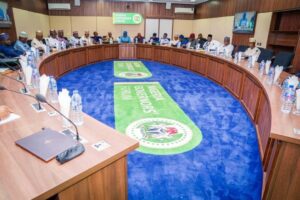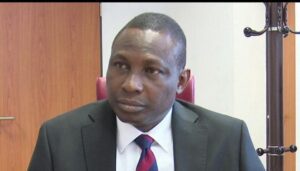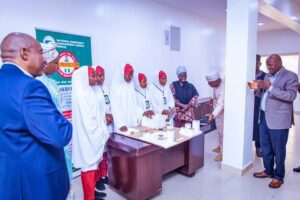


Hunger, looting, hardship in Nigeria: A ticking time bomb
The spontaneous looting which has reared its ugly head in Nigeria recently is a bad omen for the country. Within a week, series of looting of foodstuffs by the citizenry has become a regular occurrence and has attracted media attention
Nigerians are looting food depots because of hunger which may trigger violence.
In the series of looting incidents reported in several cities, those who carried out the acts blame it all on hardship and the high cost of living in Nigeria
Some youths stole food items from trucks in traffic along Kaduna Road in the Suleja area of Niger State.
Another looting occured in the Federal Capital Territory at a warehouse reportedly belonging to the National Emergency Management Agency because of lingering food crisis.
In another report, just early this month residents of Akure, Ondo state capital, on Monday, engaged in widespread looting of food items and grains conveyed by a truck into the state.
An estimated 820 million people around the world which also includes Nigerians don’t have enough food to eat.
The majority of them live in low-income rural areas – including millions of small-scale farmers who rely on meager income from commodity crops like coffee and cacao. Volatile markets, high prices, and limited options have left them struggling to put food on the table, year after year.
All these because of lack of food security.
“Food security” means that all people, at all times, have physical and economic access to sufficient food to meet their dietary needs for a productive and healthy life. Previously, it was believed that access to food was the only requirement for food security, but that perspective has changed over time to include four main pillars of food security.
According to the UNICEF report released last year- Nearly 25 million Nigerians were said to be at risk of facing hunger between June and August 2023 (lean season) if urgent action is not taken, according to the October 2022 Cadre Harmonisé, a Government led and UN-supported food and nutrition analysis carried out twice a year.
“This is a projected increase from the estimated 17 million people currently at risk of food insecurity. Continued conflict, climate change, inflation and rising food prices are key drivers of this alarming trend.”
Food access has been affected by persistent violence in the north-eastern states of Borno, Adamawa and Yobe (BAY), and armed banditry and kidnapping in states such as Katsina, Sokoto, Kaduna, Benue and Niger.
According to the National Emergency Management Agency, widespread flooding in the 2022 rainy season damaged more than 676,000 hectares of farmlands, which diminished harvests and increased the risk of food insecurity for families across the country.
The flooding is one of the effects of climate change and is impacting Nigeria. More extreme weather patterns affecting food security are anticipated in the future.
The United Nations has called on the Government of Nigeria, the donor community, and public and private stakeholders to urgently commit resources and implement mitigation measures to save lives and prevent a potentially catastrophic food security and nutrition situation.
According to some suggestions, achieving food security in Nigeria requires a multi-faceted approach. It involves investing in sustainable agricultural practices, supporting smallholder farmers, strengthening value chains, and improving post-harvest handling and storage systems.
The issue of insecurity should not be treated with kid gloves. Adequate security is needed to protect our farmers who have been away from farms as a result of bandit attacks.
The government of the day could also do more to settle some communal clashes which had made the farm a no-go area for potential farmers who had no other means of survival but to farm.
The government should also do more to cushion the effects of hunger in the land, until all these and many more options are put into consideration, hunger, hardship and food insecurity in the land remain a time bomb waiting to explode.



